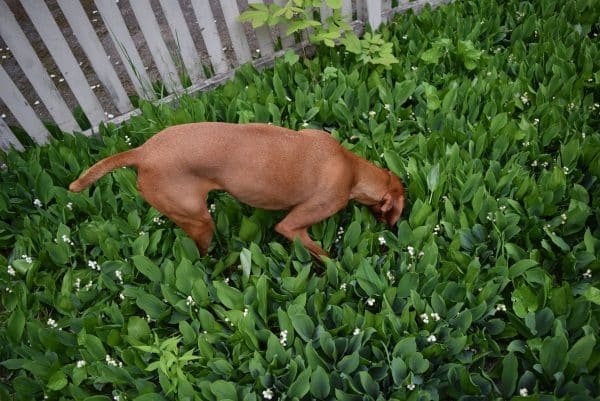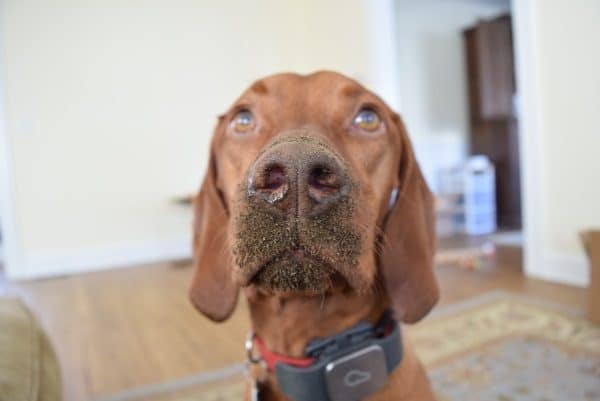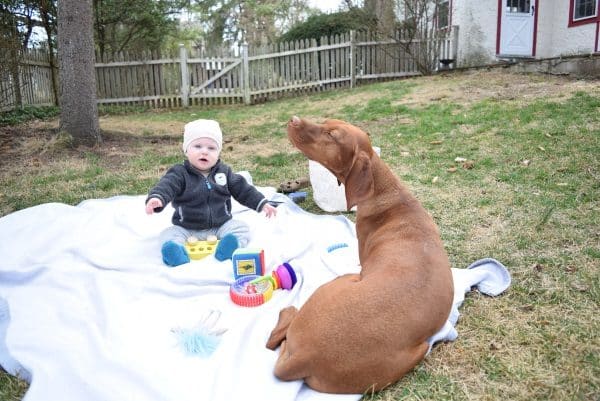I’m constantly impressed by my dog’s sense of smell, especially when she finds even weakly scented nibbles during games of hide-and-seek-the-treat around the house. At the same time, I worry that I’m filling our home with too many olfactory obstacles for her. From slow cooker meals to baby diapers to scented candles, I wonder what Finley thinks of the daily aromas wafting around our house.
“Our animals are family members and we make a commitment to take care of them,” says Tim Link, author of Wagging Tales and Talking with Dogs and Cats. “It’s important to know what they like and what they dislike, what keeps them happy and healthy,” he adds.
“Dogs have 17 times more densely innervated epithelium cells in their noses than humans,” says craniosacral therapist Sally Morgan PT CST, which essentially means dogs smell much better than we do. So what should we make of our dogs’ uniquely vivid world of smells, and what do they think of some common smells in their environment?

My dog seems to enjoy the ambient smells everywhere she goes.
Stinky socks
Pet parents might assume that the stinkier the smell, the more the dog likes something. Link says that’s true, to a degree. In fact, your pup’s attraction to your socks and underwear might have more to do with their connection to you than their pungency. “Anything that has our scent on it is going to be a positive thing to them,” Link says. To that end, when an animal goes missing Link tells clients to leave items that have the family’s scent on them, in addition to dog food, to attract the wandering pet. It’s also why many animal experts suggest wrapping your pup in an old t-shirt that you’ve recently worn to provide comfort during fireworks and thunderstorms or other loud noises.
Roadkill
As Morgan explains it, our four-legged friends are attracted to roadkill for two reasons. Firstly, their wolf ancestors were attracted to carrion while scavenging for food. The stinky smell brought a delicious reward, and they might even roll around in it to release the smells and draw other members of the pack for a meal. Secondly, rolling around in something foul smelling is a way of masking their own scent for protection.

Dogs seem to prioritize smelling things over staying clean.
Perfumes, colognes and scented candles
As you might have guessed, dogs can make the connection between you and your perfume or cologne, Link says. “The downfall to that is the fact that since their senses are so sensitive, the artificial smells are a bit too much for them,” he adds. So a few spritzes of your favorite bottled fragrance can likely be way too strong for your pup. Have you ever noticed your dog sneeze after you spray something aromatic? That’s Fido’s way of clearing his nose of an overpowering sensation. Next time, apply your perfume in a separate room with the door closed and wait for it to settle into your skin and clothes before reuniting with your pet. Morgan emphasizes that any scented products with chemical-based scents are offensive to dogs. “Part of this is because something like a strong candle will get into their coats and interfere with their natural abilities to smell food sources or mates,” she says.
Flowers
Who doesn’t love a bouquet of fresh flowers? According to Link, animals may generally be less interested in roses, hyacinths or jasmine and more into marigolds with a pungently scented stem and leaf. (They’re also great for keeping bugs out of your gardens, so double win!) But, much like humans, each animal has their own unique personality and preferences. What’s more, it’s a lot about the association between the smell of flowers and you or your mood that animals will really pick up on, and less about the fragrance of the flowers themselves. When you’re bringing flowers home as the result of happy events or a good mood, your pet will feed off of that energy.

“What’s that smell?” your pup might seem to be saying.
Essential oils
Lavender is widely known for its calming properties, and Link and Morgan are both big proponents of essential oils and holistic alternatives for animals. But don’t douse your pet bed in oil without knowing what you’re doing, Link warns. First consider the health history of your pup and how they respond to floral and herbal essences, whether there are any allergies and potential negative reactions. It’s easy to give too much, he says. So speak with your pet’s vet before administering any scents.
Morgan says some are so sensitive that just opening the bottle is sufficient to bring benefits, so start out slowly. In a similar vein, never Febreze your pet’s bed. Simply keep it clean and wash with unscented, chemical-free laundry detergent. But when it does come to essential oils, let your pet choose. Put out a few open bottles and see which one your pet gravitates toward.
Foods and cooking
Similar to humans, what each dog likes to smell in the kitchen may be different from individual to individual, though they generally seem to like meats but not fruits. Link suggests watching your pet for their cues. They might be increasingly sniffing the air as you prep and cook ingredients or even drooling a little. Licking their lips helps move more molecules of the smell into the mouth and nasal system, which dogs love, Morgan says. At the same time, an animal will spend a lot of time sniffing a food that is new or that they’re unsure of. Aversions can also be created. When Link’s dog became sick after eating cottage cheese, she associated something about the food with being ill and now she won’t touch it let alone sniff at it.

A dog’s nose is one of his greatest assets.
Dirty diapers and other garbage
Ever come home to a dog who’s been rooting through the diaper pail or trash can? Your pup could be doing this out of boredom or his diet may be lacking certain nutrients and minerals, which he’s looking to fill in all the grossest places. Morgan suggests turning to pet food expert Dr. Judy Morgan (her sister) for some insights on how to improve your pet’s nutrition. Plus, Morgan says our soil is depleted of magnesium and selenium, so these are missing from many pet foods.
Keep in mind
In addition to keeping our pets’ preferences in mind when it comes to ambient smells around the house, tapping into their sense of smell can also be useful during training and learning. Experts always say that a “stinky” treat is good bait, and that’s partly because your pet will really want that tasty reward, but also because odor information is saved in long-term memory, according to Morgan. “Associating a certain behavior with a particular stinky treat will mean that the smell of the treat will improve recall for that behavior,” she says. Moreover, the olfactory and limbic systems are closely tied, so smell is linked to emotion, which can be helpful when it comes to learning and recall. So don’t hesitate to both honor and take advantage of your pet’s incredible sense of smell.
The post How the Smells Around Your House Might Delight or Offend Your Dog appeared first on Dogster.
No comments:
Post a Comment